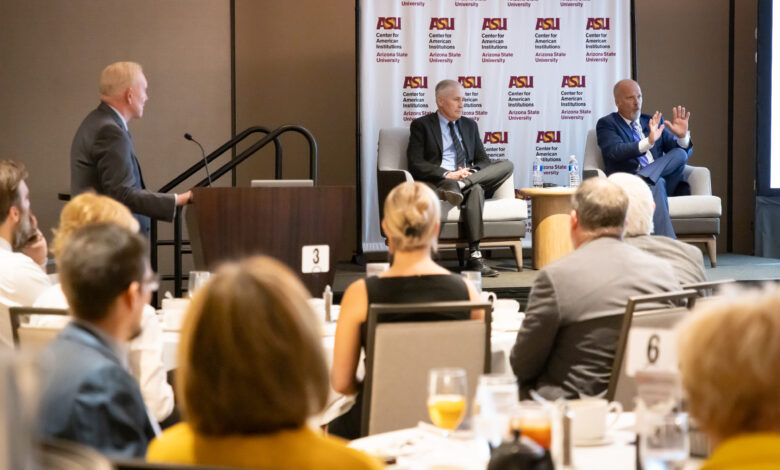ASU center works to restore trust in foundations of democracy

A new report from the Center for American Institutions at Arizona State University highlights the lack of trust the public has in the judicial system.
“The Politicization of Our Courts,” released this fall, looks at how distrust in the U.S. Supreme Court, as well as political polarization, has filtered down to state judiciaries.
That lack of trust extends to many American institutions — a problem the center was created to address, according to Donald Critchlow, director of the center and the Katzin Family Professor of History.
“We’ve seen a precipitous erosion in trust in all of these institutions — political, governmental, religious, educational, judicial, military. And it’s not healthy for democracy,” he said.
“We need to figure out why people distrust their institutions and how to renew and strengthen these institutions. That’s what our mission’s about.”
The center, which was formed three years ago, is privately funded and has launched several activities in support of civic engagement — reports, a student club, postdoctoral teaching fellows and a monthly lunch discussion.
The center’s faculty teach a certificate program in political history and leadership, in the School of Historical, Philosophical and Religious Studies, which has 120 students.
The judiciary report included a survey of people’s attitudes toward trust in their courts and also looked at six states where there were retention or elections for state Supreme Court justices. One of those states was Wisconsin, which was in the middle of a record $100 million election race for state Supreme Court at the time the survey was taken.
“Our findings were quite extraordinary. In Wisconsin, while the survey was being conducted during this Supreme Court race, most people could not answer how their Supreme Court justices were selected,” Critchlow said.
“I think our other arresting finding was that most people in the survey want justices to be elected, but they don’t like the money involved in in the election process. So, somewhat contradictory — they want politics, but don’t want politics.”
The report recommends that states use a guided-appointment system for the judiciary, like Arizona does, and also that the courts engage with the public more to explain their decisions.
“They tend to use law legalese and the decisions aren’t very clear to the public,” Critchlow said.
“Most decisions are not political and don’t involve political affairs, but the public needs to be better educated on what the state supreme courts actually do, as well as what the U.S. Supreme Court does.”
This report joins a lineup of previous national commission reports: “Civic Education in the Military,” “The Study of American History in Our Universities” and “A Thousand Points of Light Still Shine.”
Fearless discourse
The center’s student-run Politics and Leadership Club has more than 150 members, with 50 to 60 typically gathering every week for “Monday Dialogues.” The topics so far this semester have included “Divided Reality: Political Polarization and the Evolution of American Discourse” and “Campaign Finance: Is Dark Money Corrosive to American Politics?”
Later this semester, members will discuss “Raising a Family in Contemporary America” and “The Age of AI: Jobs of Tomorrow for College Graduates.”
The meetings try to be as accessible as possible, giving everyone a chance to speak, according to Jake Dueck, the club president.
“We are very proud that the Politics and Leadership Club has a very diverse range of perspectives. I always tell people we have everything from libertarians to communists and all the stuff in between,” said Dueck, who is double-majoring in history and political science with a minor in public service and public policy.
“We want to make sure that everyone can participate and that everyone can offer their piece.”
Dueck moderates the free-form discussions, which are civil and polite.
“I try to prioritize people that have counterpoints to things that have already been said. But our number one priority is to have as many different people talk as possible,” he said.
The Center for American Institutions supports the club with marketing, advising and catering the meetings.
Elise Johnson, who is majoring in politics in the economy, is vice president of the club and said that the discussions are a place to be fearless.
“A lot of times students will be like, ‘Oh, I don’t want to say what I think about this because so-and-so will get mad at me.’
“But the nice thing about the club is that everybody acknowledges, ‘Hey, half the people in the room probably don’t agree with me, but here’s what I have to say.’ People might push back a little bit but you’re fighting against the arguments, not the people.”
Dueck said the mutual respect and rapport is what sets the club apart.
“There is a kind of hunger for productive, interesting, stimulating discussion that’s hard to find, not just at ASU or at colleges, but just generally nowadays — especially among our chronically online generation,” he said.
Both Dueck and Johnson are pursuing certificates in political history and leadership, and both are research assistants for the center who worked on the judiciary report, finding scholarly articles, books and newspaper stories going back to the 1960s.
“After researching the report, I feel like I have like enough authority on the subject to have a logical discussion with somebody about it and say, ‘What do you think about this?’” Johnson said.
“I have facts to back up what I’m saying and I know what’s going on.”
Credit: Source link






